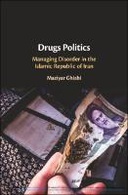Explore

Iran has one of the world’s highest rates of drug addiction, estimated to be between two and seven per cent of the entire population. This makes the questions this book asks all the more salient: what is the place of illegal substances in the politics of modern Iran? How have drugs affected the formation of the Iranian state and its power dynamics? And how have governmental attempts at controlling and regulating illicit drugs affected drug consumption and addiction? By answering these questions, Maziyar Ghiabi suggests that the Islamic Republic’s image as an inherently conservative state is not only misplaced and inaccurate, but in part a myth. In order to dispel this myth, he skilfully combines ethnographic narratives from drug users, vivid field observations from ‘under the bridge’, with archival material from the pre- and post-revolutionary era, statistics on drug arrests and interviews with public officials. This title is also available as Open Access on Cambridge Core at doi.org/10.1017/9781108567084.
This book is included in DOAB.
Why read this book? Have your say.
You must be logged in to comment.
Rights Information
Are you the author or publisher of this work? If so, you can claim it as yours by registering as an Unglue.it rights holder.Downloads
This work has been downloaded 65 times via unglue.it ebook links.
- 65 - pdf (CC BY-NC-ND) at OAPEN Library.
Keywords
- Crime & criminology
- Drugs
- Drugs trade / drug trafficking
- Iran
- Politics
- Politics & government
- Social services & welfare, criminology
- Society & Social Sciences
- thema EDItEUR::J Society and Social Sciences::JK Social services and welfare, criminology::JKV Crime and criminology::JKVG Drugs trade / drug trafficking
- thema EDItEUR::J Society and Social Sciences::JP Politics and government
Links
DOI: 10.1017/9781108567084Editions

